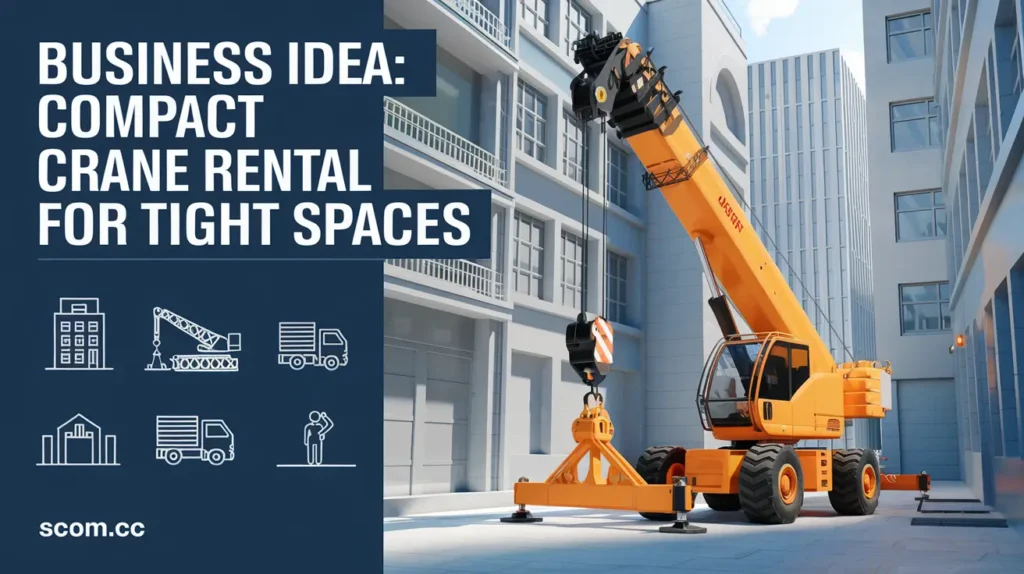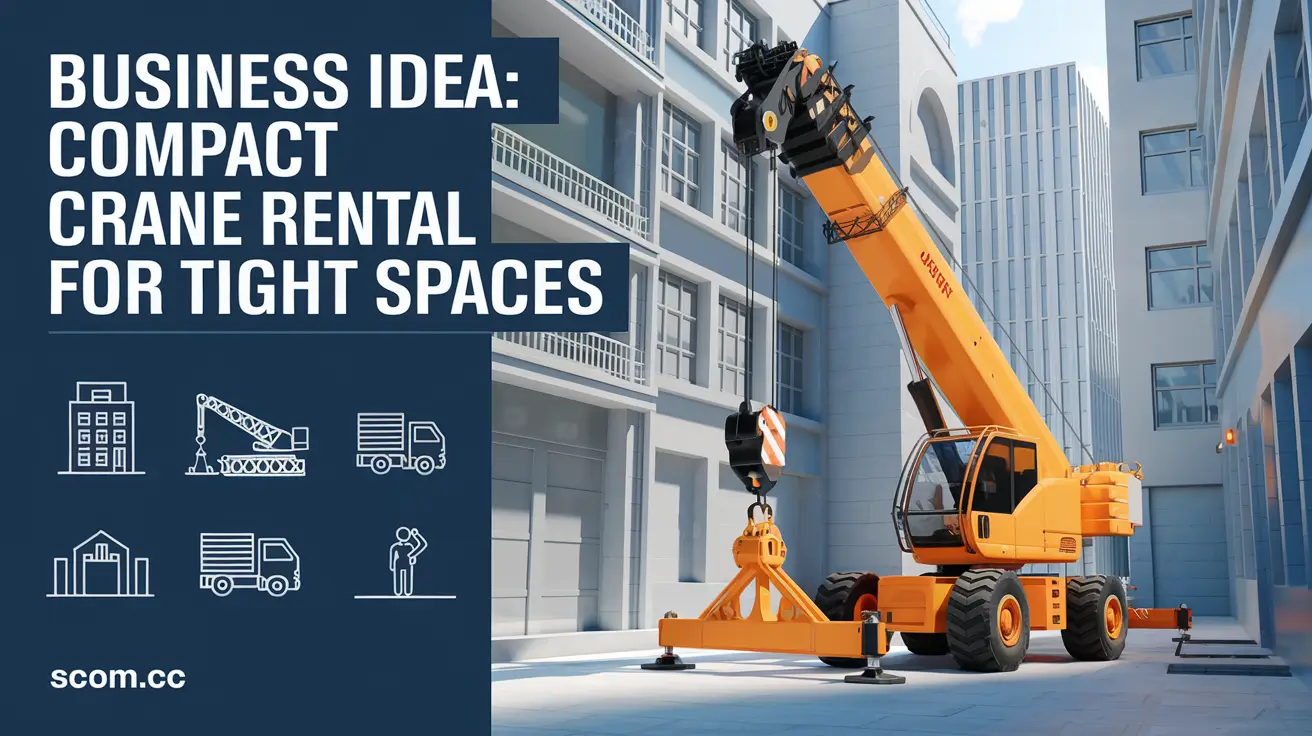Business Idea Compact Crane Rental for Tight Spaces

- Business Idea Compact Crane Rental for Tight Spaces
- Introduction to Compact Crane Rental for Tight Spaces
- What Are Compact Cranes?
- Market Potential for Compact Crane Rental
- Initial Costs and Investment
- Benefits of Compact Crane Rental
- Challenges and Considerations
- Legal and Regulatory Aspects
- Marketing and Placement Strategies
- Future Trends and Innovations
- Conclusion
- Summary Table
-
FAQ
- What are compact cranes?
- Where are the best markets for compact crane rental?
- What are the initial costs for a compact crane rental business?
- What are the main benefits of renting compact cranes?
- What challenges might businesses face with compact crane rental?
- What legal and regulatory aspects should be considered?
- How can businesses effectively market compact crane rental services?
Business Idea Compact Crane Rental for Tight Spaces
Provide remote-controlled cranes for construction projects in confined spaces or events, facilitating equipment movement in hard-to-access locations.
Compact Crane Rental for Tight Spaces: An In-Depth Guide
Introduction to Compact Crane Rental for Tight Spaces
Compact cranes are specialized cranes designed to operate in tight or confined spaces where traditional cranes cannot reach. These remote-controlled machines are essential for construction projects, events, and other applications requiring precise equipment movement in hard-to-access locations. This guide explores the concept of compact crane rental, its market potential, initial costs, benefits, challenges, and considerations for establishing a rental business in this niche.
What Are Compact Cranes?
Compact cranes are small, versatile cranes engineered for maneuverability and functionality in confined or limited spaces. These cranes are equipped with remote control systems, allowing for precise operation and movement in challenging environments. They are used in various sectors, including construction, events, and maintenance, where space constraints make traditional cranes impractical.
Key Features
- Remote Control Operation: Allows for precise control from a safe distance.
- Compact Design: Small footprint for operation in tight spaces.
- Versatility: Capable of handling various types of loads and materials.
- Maneuverability: Designed to navigate narrow paths and confined areas.
Market Potential for Compact Crane Rental
The demand for compact cranes is growing due to the increasing need for specialized equipment in constrained environments. These cranes are valuable for construction projects, events, and maintenance tasks where space limitations pose significant challenges.
Target Markets
- Construction Sites: Ideal for urban construction projects where space is limited.
- Events: Useful for setting up large equipment or structures in confined event spaces.
- Maintenance and Repairs: Facilitates equipment movement in hard-to-reach areas for repairs and maintenance.
- Warehouses and Industrial Facilities: Assists in moving materials in tight storage areas.
Initial Costs and Investment
Starting a compact crane rental business involves several initial costs, including purchasing or leasing the cranes, setting up the operation, and maintaining the equipment. Understanding these costs is crucial for effective financial planning and budgeting.
Cost Breakdown
- Crane Purchase or Lease: Prices for compact cranes vary based on size and features, starting from around $10,000 and reaching up to $100,000 for advanced models.
- Setup and Installation: Includes costs for transporting and setting up the cranes at the rental location.
- Maintenance: Regular servicing and repairs to ensure optimal performance.
- Insurance: Coverage for the cranes and any potential liabilities.
Benefits of Compact Crane Rental
Compact crane rental offers several advantages, making it an attractive option for businesses and projects requiring equipment movement in tight spaces. These benefits include flexibility, efficiency, and cost-effectiveness.
Advantages
- Enhanced Flexibility: Suitable for a wide range of applications in confined spaces.
- Increased Efficiency: Speeds up the movement of materials and equipment in challenging environments.
- Cost-Effective: Renting cranes reduces the need for large capital investments.
- Safety: Remote control operation enhances safety by keeping operators away from potential hazards.
Challenges and Considerations
While compact crane rental offers numerous benefits, there are challenges that businesses must address. Proper planning and management are essential for overcoming these obstacles and ensuring successful operation.
Common Challenges
- Equipment Size and Weight: Despite being compact, cranes can still be heavy and require careful handling.
- Technical Expertise: Operators need training to effectively use remote control systems and handle the cranes.
- Market Competition: Competition from other rental services and equipment providers.
- Maintenance and Repairs: Regular upkeep is necessary to avoid downtime and ensure reliable performance.
Legal and Regulatory Aspects
Operating a compact crane rental business involves adhering to various legal and regulatory requirements. These regulations ensure compliance and safety in the use of cranes and related equipment.
Key Regulations
- Safety Standards: Compliance with safety regulations for crane operation and maintenance.
- Licensing and Certification: Ensuring that operators have the necessary licenses and certifications.
- Insurance: Obtaining adequate insurance coverage for the cranes and liability protection.
- Equipment Certification: Ensuring that the cranes meet industry standards and regulations.
Marketing and Placement Strategies
Effective marketing and strategic placement of compact crane rental services can enhance their impact and profitability. Businesses should consider how to leverage these services to attract and retain clients.
Marketing Tips
- Highlight Versatility: Emphasize the crane's ability to operate in tight spaces and handle various loads.
- Target Specific Sectors: Focus marketing efforts on industries and sectors that frequently need compact crane rental services.
- Showcase Case Studies: Provide examples of successful projects where the compact crane was used effectively.
- Offer Competitive Pricing: Develop pricing strategies that attract clients while ensuring profitability.
Future Trends and Innovations
The compact crane rental industry is evolving, with new trends and innovations emerging. Staying informed about these developments can provide businesses with a competitive edge.
Emerging Trends
- Advanced Remote Controls: Integration of smart technology for enhanced control and monitoring.
- Eco-Friendly Designs: Adoption of green technologies and energy-efficient models.
- Increased Customisation: Development of cranes with customizable features for specific applications.
- Integration with Software: Use of software solutions for better management and operation of rental fleets.
Conclusion
Compact crane rental for tight spaces offers a valuable opportunity for businesses to provide specialized equipment for challenging environments. By understanding the market potential, managing initial costs, and addressing challenges, entrepreneurs can successfully establish and grow a rental business in this niche. With careful planning and effective marketing, compact cranes can meet the growing demand for precise equipment movement in confined spaces.
Summary Table
| Aspect | Details |
|---|---|
| Product | Remote-controlled cranes for tight spaces |
| Key Features | Remote control operation, compact design, versatility, maneuverability |
| Target Markets | Construction sites, events, maintenance and repairs, warehouses and industrial facilities |
| Initial Costs | $10,000 to $100,000 per crane, plus setup, maintenance, and insurance |
| Benefits | Enhanced flexibility, increased efficiency, cost-effective, improved safety |
| Challenges | Equipment size and weight, technical expertise, market competition, maintenance and repairs |
| Legal Requirements | Safety standards, licensing and certification, insurance, equipment certification |
| Marketing Strategies | Highlight versatility, target specific sectors, showcase case studies, offer competitive pricing |
| Future Trends | Advanced remote controls, eco-friendly designs, increased customisation, integration with software |
FAQ
What are compact cranes?
Compact cranes are small, versatile cranes designed for use in confined or limited spaces, equipped with remote control systems for precise operation.
Where are the best markets for compact crane rental?
Ideal markets include construction sites with space constraints, event organizers, maintenance and repair services, and warehouses or industrial facilities.
What are the initial costs for a compact crane rental business?
Initial costs include $10,000 to $100,000 for purchasing or leasing cranes, setup and installation expenses, maintenance, and insurance.
What are the main benefits of renting compact cranes?
Benefits include enhanced flexibility for tight spaces, increased efficiency, cost-effectiveness compared to purchasing, and improved safety with remote operation.
What challenges might businesses face with compact crane rental?
Challenges include managing equipment size and weight, ensuring technical expertise, facing market competition, and maintaining and repairing the cranes.
What legal and regulatory aspects should be considered?
Businesses must comply with safety standards, obtain necessary licenses and certifications, secure insurance coverage, and ensure equipment certification.
How can businesses effectively market compact crane rental services?
Effective marketing strategies include highlighting the crane’s versatility, targeting specific sectors, showcasing successful case studies, and offering competitive pricing.

If you enjoyed this article and found it valuable, we encourage you to explore our news and valuable information section, where you'll find more relevant and up-to-date content that may pique your interest. Additionally, if you are seeking advice or need guidance on a specific topic, we suggest visiting our services section. There, you will find a variety of options designed to assist and support you in addressing your needs. Feel free to check out both sections to get the information and assistance that best suits your requirements.

Leave a Reply